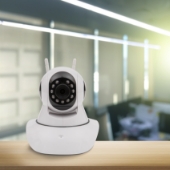
There are a number of ways that VoIP eavesdropping can happen, including:
- Man-in-the-middle attacks: This type of attack occurs when a hacker inserts themselves into the middle of a VoIP call and intercepts the packets being transmitted between the two callers. The hacker can then listen in on the call or even modify the packets to change the conversation.
- Malware: Hackers can also use malware to eavesdrop on VoIP calls. Malware can be installed on a VoIP device or computer through phishing emails, malicious websites, or USB drives. Once the malware is installed, it can give the hacker access to the device’s microphone and camera, allowing them to listen in on and record calls.
- Vulnerabilities in VoIP software: VoIP software can also contain vulnerabilities that can be exploited by hackers to eavesdrop on calls. For example, a hacker could exploit a vulnerability in a VoIP server to gain access to call records or even listen in on live calls.
By taking the following measures, businesses can protect themselves from VoIP eavesdropping:
1. Change default usernames and passwords
Many businesses don’t bother to change the default login credentials for their VoIP system, but this is an essential security measure. By changing the default usernames and passwords, businesses make it harder for hackers to gain access to their system.
2. Keep your VoIP system updated
Hackers are constantly looking for vulnerabilities in software, so it’s important to keep your VoIP system up to date with the latest security patches. Check with your VoIP provider regularly for updates and install them as soon as possible.
3. Keep your session border controllers (SBCs) updated
When you update your SBCs, you’re also updating your VoIP’s antivirus software, which helps to protect your systems from known types of malware. This also helps to ensure that your calls aren’t being rerouted through malicious VoIP servers, which could be used to eavesdrop on conversations.
4. Use a VPN or SRTP
Phone calls made over the internet are transmitted in the form of data packets. If these packets are intercepted, anyone can listen in on your conversations. To prevent this from happening, you need to encrypt your VoIP calls.
You can do this by using a virtual private network (VPN), which encrypts all the data passing through your device. Alternatively, you can use Secure Real-Time Transport Protocol (SRTP), a VoIP security protocol that encrypts voice calls.
5. Train your employees
Your employees need to be aware of the dangers of VoIP eavesdropping. Teach them not to give out confidential information over the phone and make sure they know how to spot signs that someone may be trying to listen in on their conversations, such weird electronic sounds or unusual instances of muting.
By following these tips, you can protect your business from VoIP eavesdropping and keep your communications confidential. To learn more about keeping your VoIP system from unwanted intruders, reach out to our technology experts today.